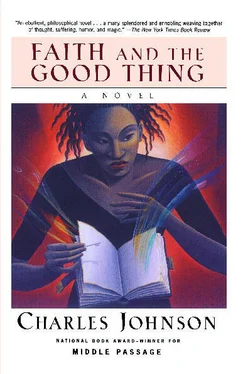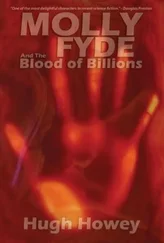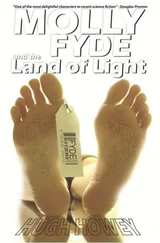Her thoughts had been elsewhere. For hours she struggled with the desire to kiss her mother good-bye. She did, finally, holding her breath and lightly brushing her lips along Lavidia’s dry forehead. It tasted like wax. Nestled under Reverend Brown’s arm for support, she followed the grim gravediggers back to the farm. The diggers — silent, muscular, and methodical men in faded overalls — opened the earth beside Todd Cross’s headstone, situated just yards from the farmhouse. They shoveled clumps of loose sod over the casket, buried Lavidia’s most prized possessions with her so she’d not return for them, and left with the minister like mute zombies in Brown’s employ. Faith remained. What had she felt standing there in the sunburnt grass between the two square markers? Round wreaths lay across the front of each. Only five feet separated the headstones, but Faith sensed that if she thrust her hand between them she would be brought again into the turbulence, caught in the conflict between Lavidia’s world and that of her father. She studied that space, watching it fill with remembrances fond, familiar, and sometimes frightening as her shadow swelled with the sun’s passage toward afternoon. Lavidia would have been pleased with the inscription on her marker. The words capsulized her reaction to the truth as told by the man of science: the man called Lynch.
Time often distorted Faith’s memory, but now it was clear. She remembered: a few months after Todd’s death in the time of Dirty Mouth when children eat the new, golden grain, Lavidia took sick with a virus. Faith called for Dr. Leon Lynch, who practiced medicine in a cluttered one-room office in town next to the mortuary and had, it was said, attended all the great schools. It rained that night, with thunder so violent portions of the roof buckled and dripped water to the floors. They say it was so dark that raindrops knocked on people’s doors, begging for candles just to see how to strike the ground. Faith went frequently to the front window, smeared away swirls of steam on its glass, and watched for his coming. Betimes, the weather built to a thunderstorm. The outlines of water pumps and oaks in the front yard grew obscure. Dr. Lynch first appeared in the front yard as a distant shadow floating through the downpour, a plodding shape oblivious to the elements and electricity in the air. As he crept up the front porch, his shoulders hunched forward, and the brim of his hat ran water before his face. A shapeless hat, a down-turned, glowing Bull Moose pipe jutting from the drawn-up collar of his coat — these were all Faith could see until she unlatched and opened the door. Lynch wavered in the doorway, towering over her, so tall he could, at the same time, have gotten his hair cut in Heaven and his boots shined in Hell. He was tall, children. Before he entered, his tiny, alert eyes studied the dim interior of the front room, his gaze flitting from the cold fireplace, the old pine cupboard and sawbuck table, to the ladder-backed chair and candle stand by the door. Faith retreated to the bedroom, and he followed her, tracking soft mud through the front rooms and kitchen. In Lavidia’s bedroom Lynch again scanned the walls, ceiling, furniture, and shadows nervously before dragging a bow-backed chair against the wall to her bedside. He peeled off his wet coat and spoke hurriedly, the pipe stem bobbing between his clenched teeth:
“Cold?”
“Yes,” Lavidia said, shivering under several quilts.
“Temperature?” He looked at Faith. Who was too frightened to answer, but managed, though she couldn’t find her tongue, to take his wet coat.
“Open your mouth,” Lynch told Lavidia; then, as an after-thought, “please.” Lavidia obeyed, and from his black bag Lynch removed a wooden tongue-depressor, a thermometer, and items Faith was unfamiliar with (Did he need all that for healing? Conjure doctors only used dove’s blood, asses’ milk, and fresh cabbage dew, and with them could cure everything from sores in a horse’s eye to impotency). She was shocked that he had not asked her to leave the room before he pulled Lavidia’s nightgown up. It was odd, upsetting, to see your mother’s breasts, half-filled flaccid things lying across her like enormous leeches. Lynch ignored Faith’s reaction completely, and she knew immediately that he was one of those people who thought all children were, if not sophisticated but curious animals, at least aberrations of nature.
Faith, seated behind him on a three-legged footstool, studied him carefully. He was revolting, hatchet-faced, and had a figure so scrawny it seemed to have been stretched on a rack; his long arms and legs were gaunt and angular in a blue serge suit shiny with age. Lynch’s right leg must have been artificial, fashioned from plastic or wood, because whenever his pipe flickered out with a hiss from tar and saliva backed into its stem, he would bang the ashes free of its bowl by striking it against his right knee. The sound was that of wood striking wood. A golden watch chain swung from beneath his open suitcoat, and both his shoes seemed enormous — perhaps size thirteen, with inch-thick soles. The back of Lynch’s neck was ruffled with obscene little folds, his face and hands looked sedimented with a grimy material that had permanently worked its way under his skin, beneath his broken fingernails and into his large pores. His head was pear-shaped and balding, his mouth was full of gum-line cavities when he smiled, and about him was the smell of rubbing alcohol and sulfur.
Understand, men like Lynch are rare in these parts. In truth, rare any where. They have in their hearts a homesickness that burns like an ulcer. Burns them up. Some find, in the end, their own hands turned against them. Like Beaumont Gaines, once said to be the smartest man in Hatten County. That he had to die like any other man got the best of Beaumont. “All men are mortal,” he told himself. “Beaumont Gaines is a man; therefore—” But he refused to believe the major premise — decided, he did, to check it out. The hunters came across him while chasing a hart into the hollow. Armed with slide rules and medical instruments, he was tearing open graves in the hollow, which was where they found him; also, where they burned him.
Even though Lynch handled Lavidia roughly, she trusted him more than she did the root workers Todd brought to the farmhouse whenever she was sick. She believed in him and asked how she was, how she really was. What followed was a tale as strange as anything to come from the mouth of the Swamp Woman.
The doctor slowly replaced all his instruments after inspecting each by the light of the single oil lamp burning on Lavidia’s nightstand. For a long time he said nothing. He filled the bowl of his pipe with a green sweet-smelling tobacco, smoothed its surface even with his forefinger, and drew carefully, thoughtfully, with painfully controlled breaths, on the stem. Soon, clouds of smoke rose around his head.
“If I tell you,” he said, “you’ll have to promise not to interrupt me until I’ve finished.” His voice had grown deeper, more strained and troubled. In tone it was a lecturer’s voice, or that of a man talking to himself at some lonely hour. “I despise interruptions.” His lips parted in a tigerish grin. Biting on his pipe stem forced his lips apart, baring brownish teeth. Uncertain how to respond, Lavidia smiled. The effort faded fast.
“It’s a terribly long story,” Lynch whispered, “billions of years old. You must be patient.”
She bobbed her head as the doctor glared at her. Only the right side of his face was lit by the lamp. His single visible eye did not blink, but its surface glistened with moisture.
He said, “Billions of years ago an explosion of tremendous magnitude occurred in space, and our universe was aflame with radiant energy until darkness fell.” Lynch jerked his hands above his head to describe the event, and left them in the air, motionless. He described matter forming, gaseous clouds aflame throughout the cosmos, the impossibility and undesirability of infinite regress, and the Fallacy of the First Cause. “Around these rotating clouds matter condensed to form our earth, which was cold then, so cold that it froze water vapor, nitrogen, carbon oxides, ammonia, and, of course, methane. On our earth, snow fell, and at a speed that could generate enough heat to melt this cosmic snow itself. A crust formed on the earth, and above it — oceans—”
Читать дальше












